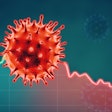
Siemens Healthineers on Wednesday reported fiscal second quarter revenue of 5.35 billion euros ($5.86 billion), down 2% from 5.46 billion euros in Q2 2022, beating analysts’ consensus estimate of 5.28 billion euros.
For the quarter ended March 31, the Erlangen, Germany-based firm saw materially lower revenue from rapid COVID-19 antigen tests. Excluding rapid antigen tests, revenue rose 11% on a comparable basis.
Second-quarter Diagnostics segment revenue was 1.08 billion euros, a drop of 39% year-over-year compared to 1.77 billion euros in the prior-year quarter. The company booked 4 million euros from rapid COVID-19 antigen tests in the second quarter compared to 678 million euros in the prior year.
Excluding the rapid antigen tests, Diagnostics revenue was down about 1%, primarily due to declining sales of COVID-19 tests other than antigen tests. In China, the Diagnostics segment saw a significant rise in revenues. Diagnostics revenues in the Americas and the Europe, Middle East, and Africa (EMEA) regions fell by a mid-double-digit percentage and in Japan by a mid-single-digit percentage, mainly due to lower year-over-year sales of rapid COVID-19 antigen tests.
Managing pendulum swings in demand, with testing moving from COVID toward routing testing and back, has been one of the main challenges for IVD companies and their customers during the pandemic, Sharon Bracken, president of diagnostics at Siemens Healthineers, told LabPulse. As the pandemic moves into an endemic phase, swings in demand are starting to normalize, she added.
“In terms of volumes, we are seeing a recovery back to the low- to mid-single-digit type growth,” Bracken said.
In its other businesses, Siemens Healthineers booked 2.92 billion euros in revenue for its Imaging business, an increase of 12% year-over-year; 934 million euros for its Varian imaging and cancer care business, which grew 28% year-over-year; and 498 million euros for its Advanced Therapies business, an increase of 9% year-over-year.
Siemens Healthineers Q2 net income was 108 million euros, or .09 euros per share, compared to 583 million euros, or .52 euros per share, in the prior-year quarter. Its Q2 adjusted earnings per share were .43 euros and beat analysts’ consensus estimate of .42 euros.
For fiscal year 2023, the company expects comparable revenue growth of -1% to 1%. Excluding revenue from rapid COVID-19 antigen tests, that corresponds to comparable revenue growth of 6% to 8%. Adjusted basic earnings per share (EPS) are still expected to be between 2 euros and 2.20 euros.
For the Diagnostics segment, the firm now expects comparable revenue growth of -23% to -26%, which compares to its previous expectation of -19% to -21%. Excluding revenue from rapid COVID-19 antigen tests, that corresponds to comparable revenue growth of -2% to 1%, compared to 3% to 5% that it anticipated previously. In 2023, the company expects 100 million euros in revenue from rapid COVID-19 antigen tests.
Growth in point-of-care testing during the pandemic has likely had a lasting effect on the diagnostic industry, Bracken said.
“Technologies that have emerged to enable testing closer to the patient, or testing closer to your home --- the informatics, the apps, the ability to take results and give them to your doctor to enable remote care, there was a tremendous amount of progress that helped the industry move ahead,” Bracken added.



















